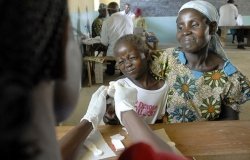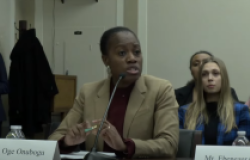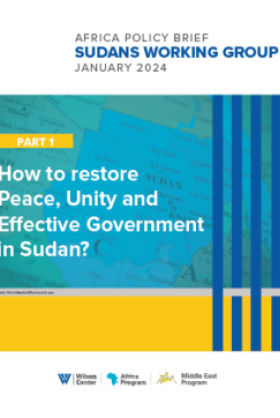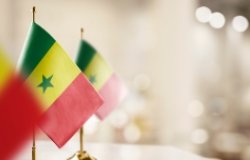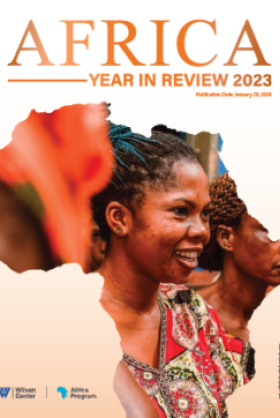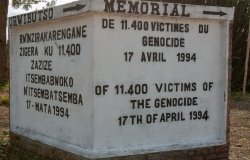African Ambassadors' Policy Roundtable II: The U.S. and Africa: Current and Future Relationships
The Woodrow Wilson International Center for Scholars and joined the African Diplomatic Corps to host Washington- based African Ambassadors at a roundtable discussion held at the Wilson Center from 8:00 -10:00am on April 18th, 2007. The roundtable provided an in-depth overview of current and future US and Africa relationships.
Overview
Introduction
Ambassador Howard Wolpe, Director, Africa Program and Project on Leadership and Building State Capacity, Woodrow Wilson International Center for Scholars (WWICS)
H.E. Ambassador Nabil Fahmy, Ambassador of Egypt to the United States; Chairman of the Committee on Capacity Building of the Washington-based African Diplomatic Corps
Panel: The US and Africa: Current and Future Relationships
The Honorable Russell Feingold (D-WI), Chairman of the Subcommittee on African Affairs, Senate Foreign Relations Committee
The Honorable Donald Payne (D-NJ), Chairman of the Subcommittee on Africa and Global Health, House Foreign Affairs Committee
Florizelle Liser, Assistant US Trade Representative for Africa, Office of the US Trade Representative
James Swan, Deputy Assistant Secretary, Bureau of African Affairs, US Department of State.
The Africa Program of the Woodrow Wilson International Center for Scholars, in collaboration with the Committee on Capacity Building of the Washington-based African Diplomatic Corps, chaired by His Excellency Ambassador Fahmy, Ambassador of Egypt to the United States, hosted the second policy roundtable for African Ambassadors on April 18, 2007. The policy roundtable brought together African Ambassadors and high-ranking embassy officials for a panel discussion intended to provide an overview of current and future relationships between the US and Africa.
Ambassador Wolpe opened the meeting and introduced the panelists particularly thanking Senator Russell Feingold and Congressman Donald Payne for making time to speak with the African Ambassadors. Ambassador Fahmy welcomed participants to the second policy roundtable of the two-part series directed at strengthening the diplomatic capacity and effectiveness of African embassies by providing in-depth, policy oriented briefings on issues of strategic importance to senior-level African diplomats. Specifically, he explained that the second roundtable was intended to focus on both current and future relationships between the US and Africa.
Indicating that "this really is a critical time in US-African relations," Senator Russell Feingold emphasized the growing awareness of African issues in the US Congress in recent years. Senators, he explained, are working to raise the profile of Africa in a balanced and constructive manner despite the media's negative focus on the continent's conflicts. Noting the shared common interests identified by the US and Africa, including peace, improved quality of life and democratic institution building, Senator Feingold expressed optimism about Africa's future. Both the international community and the US government are focused on developing coordinated strategies for capacity building and aid distribution to maximize Africa's potential for progress. Specifically, Senator Feingold advocated for a US foreign policy towards Africa that promotes counterterrorism efforts while promoting human rights initiatives. In the case of Darfur and Somalia, he expressed a commitment for robust multilateral peacekeeping missions and long-term comprehensive strategies to address root causes of conflict.
Congressman Donald Payne emphasized the importance of fostering discussions between African country representatives and the US Congress. Recognizing the complicated nature of relations between the US and Africa resulting from historical and current dynamics that give way to power politics, these discussions, he noted, are not only pertinent within the subcommittees on African Affairs, but would also be useful in other areas such as Agriculture, Health and Human Services.
Speaking to current peace-building efforts on the continent, Congressman Payne indicated the importance of establishing an effective peer review system under the revitalized African Union. Concerning agricultural trade, he suggested that American subsidies on cotton need to be addressed to create a "level playing field" to alleviate the impact on African cotton producers. Recognizing that Africa has the potential to be the "bread basket" of the world, progress towards this goal should be encouraged. Finally, Congressman Payne applauded the development of democracy on the continent in recent decades and cited several examples of countries in which support for the democratic process is growing.
Florizelle Liser provided an overview of bilateral trade opportunities that exist between the US and African countries. These trade relationships, she explained, are supported by the African Growth and Opportunity Act (AGOA) and through cooperation with the World Trade Organization (WTO). In addition, these relationships have been fostered through a commitment to building trade capacity and creating dialogue among high- ranking officials.
AGOA allocations, Liser explained, are determined by the US Congress. Currently, thirty-eight countries qualify. Qualification is based on the measurement of a county's "continual progress" toward rule of law, open markets, poverty reduction, labor rights and other specific indicators. The Act, which has been extended through 2015, has been critical in helping to boost two-way trade between the US and Sub-Saharan Africa. Liser also identified diversification, support for reform efforts in Africa and new investment generation as important elements of improving trade.
In 2006, US exports to Sub-Saharan Africa totaled $12.1 billion, while imports reached $59.2 billion, representing a large, but desirable trade deficit. Additionally, Liser noted that the trend of non-oil trade is rising with particular increases in agricultural products including Rwandan coffee, African cut flowers, cashews from Mozambique and tuna from Mauritius. Liser applauded AGOA's initiatives for stimulating US foreign direct investment in Africa that is currently listed at $14.8 billion in 2005, up sixteen percent from the previous year.
In regards to the WTO, Liser stressed American commitment to resolving the Doha Round talks by the end of 2007 which would reduce barriers to South-South trade. Liser noted that access to markets alone is insufficient to stimulate increased trade. The use of integrated organization, trade hubs and coherent development strategies are also necessary to increase the financial impact of programs like the African Global Competitiveness Initiative (AGCI) which is valued at $200 million over five years. Liser concluded by encouraging high-level dialogue and diplomatic support for increasing trade between the US and Africa.
James Swan outlined the US Department of State's policies towards Africa and its strategic outlook on the continent. He referred to the president's National Security Strategy of March 2006 that is composed of three elements directed at "making African countries safer, freer and better."
Regarding security, Swan noted that US and African relations are heavily focused on conflict resolution—with recent emphasis on Darfur and Somalia—and on post-conflict reconciliation in countries such as the Democratic Republic of the Congo, Burundi, Liberia and Southern Sudan. Specifically, the US hopes to improve upon the capabilities of African security forces through the African Contingency Operations Training Assistance program (ACOTA).
Concerning the second element of the strategy, freedom in Africa, the US government supports the "Freedom Agenda" that is heavily centered on promoting democratic elections, instituting more just judicial systems, supporting the free press, developing functioning political parties and contributing to a vibrant civil society.
As regards the third element of the strategy, the US has committed to higher levels of assistance for development initiatives in Africa to promote a ‘better' Africa. The US is currently allocating funds in excess of $5 billion to projects in Africa. Such programs include the President's Emergency Plan for AIDS Relief (PEPFAR), the President's Malaria Initiative and the Millennium Challenge Corporation. In closing, Swan referenced Secretary of State Condoleeza Rice's Transformational Diplomacy Agenda that is fostering US partnerships with African regional institutions.
The discussion concluded with an in-depth question and answer session and closing remarks by Howard Wolpe.
Drafted by Thomas Gilchrist, Africa Program Intern and Doreen Chi, Program Assistant, Africa Program.
Hosted By

Africa Program
The Africa Program works to address the most critical issues facing Africa and US-Africa relations, build mutually beneficial US-Africa relations, and enhance knowledge and understanding about Africa in the United States. The Program achieves its mission through in-depth research and analyses, public discussion, working groups, and briefings that bring together policymakers, practitioners, and subject matter experts to analyze and offer practical options for tackling key challenges in Africa and in US-Africa relations. Read more
Thank you for your interest in this event. Please send any feedback or questions to our Events staff.




